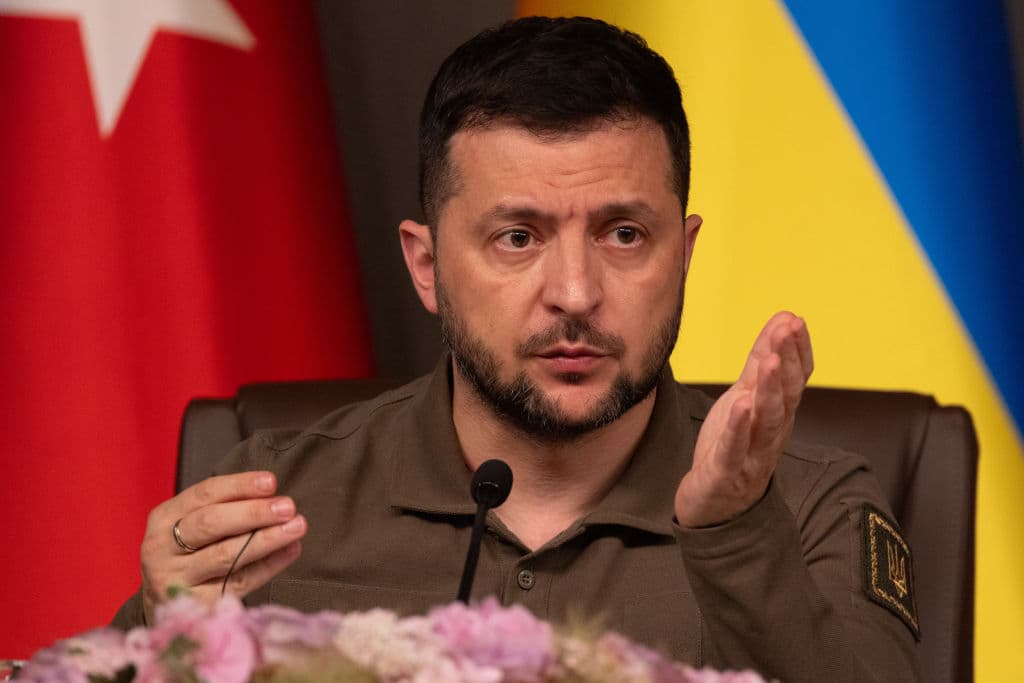Majority of Ukrainians Hold Zelensky Responsible for Government Corruption: Poll
Yet in the latest round of pushback on graft, the Ukrainian president vetoes a bill that would have let officials conceal private assets.

Corruption is a recurring item on Ukraine’s crowded menu, and a majority of Ukrainians seem to hold President Zelensky responsible for it. According to a recent poll conducted by a Ukrainian think tank, 78 percent of Ukrainians believe that the president bears direct responsibility for government corruption at both the national level and across regional administrations.
The survey results, published in the Kyiv Independent and other Ukrainian press, could spell fresh headaches for a charismatic leader who is working to rally the world to Ukraine’s side nearly 20 months after Russia invaded the country.
Stamping out graft in Ukraine has been a persistent problem practically since the country gained independence from the former Soviet Union, in 1991. More recently it has emerged as a factor that gives some lawmakers pause about supplying the country with open-ended financial support.
Last year, Senator Paul stalled the Senate’s passage of $40 billion in aid to Ukraine and he has since led the charge for a top-level audit, seeking the inclusion of an inspector general to track spending. That has not happened, but the new poll results will likely accelerate the push for more oversight.
Pervasive corruption in Ukraine has affected not only the country’s long-term prospects for membership in the European Union but also the day-to-day functioning of the national government during a time of war. Earlier this month Mr. Zelensky fired his defense minister, Olekseii Reznikov, following a series of corruption scandals including one involving the purchase of jackets for the army. The move to clean things up was itself not without controversy.
In January, several senior government officials resigned over corruption allegations and others were fired. The president’s deputy chief of staff, Kyrylo Tymoshenko, resigned after claims he used a vehicle meant for humanitarian purposes and evacuations for personal use. A minister for regional development, Vasyl Lozynsky, was arrested for allegedly taking $400,000 in bribes in exchange for electric generators.
If Mr. Zelensky’s efforts to clamp down on graft have been persistent, the poll respondents did not seem to be overly impressed. The survey found that among respondents aged 18 to 29, 70 percent are of the opinion that the head of state is responsible for corruption, while among those aged 60 and up the figure is 81 percent.
Intriguingly, the destruction wrought by Russia was not named as the biggest obstacle to Ukrainian entrepreneurship and development, but was second to corruption.
The survey was conducted by the Ilko Kucheriv Democratic Initiatives Foundation with the Kyiv International Institute of Sociology in July and included 2,011 respondents from all Ukrainian regions except for, notably, Russian-occupied Crimea and the Donetsk and Luhansk provinces. In the Zaporizhzhia and Kharkiv regions, the survey was conducted in areas controlled by Ukraine and in which hostilities are not taking place.
A separate poll conducted in August by the foundation and the Razumkov Center showed that 55 percent of Ukrainians think the country’s acceptance of military aid from its allies should be tied to effective anti-corruption measures.
A new development at Kyiv hints that Mr. Zelensky is aware of how big an issue corruption is in the war-torn country, both for Ukrainians and allies in the West. On Tuesday he vetoed a bill that was recently passed by Ukraine’s parliament, the Verkhovna Rada, that contained restrictions on electronic declarations of assets during martial law.
While that might seem innocuous, in reality the law generated considerable controversy in Ukraine because it would have allowed government officials to conceal their private assets on the basis of the state of marital law. When the Verkhovna Rada voted last week to restore the law, suspended since the Russian invasion, by which officials would be required to disclose their assets, it contained a loophole to keep a lid on such disclosures for another year.
Perhaps in an effort to avoid a repeat of last January’s flurry of sackings and resignations, Mr. Zelensky wasted little time to clear the slate. “I think everyone understands the reason for this veto: declarations should be open,” a tired-looking Mr. Zelensky said in a video on Telegram, adding, “Immediately. Not in a year. The registry [of assets] should be opened now.”
Mr. Zelensky has hinted that Ukraine’s current state of martial law could be suspended in order for parliamentary elections to be held this year. Those would normally be held in October, and the current period of martial law expires on November 15. Presidential elections would normally be held in March 2024.
Some battlefront developments, in the meantime, were looking up for Ukraine even as doubts linger as to the effectiveness of the counteroffensive. On Monday Ukraine recaptured strategic gas and oil drilling platforms from Russia in the Black Sea and claimed gains in occupied areas near Bakhmut. According to Ukraine’s defense ministry, retaking the so-called Boyko Towers platforms will provide an energy source, and it returns to Ukraine an asset that Russia seized in 2015 following the illegal annexation of Crimea.

